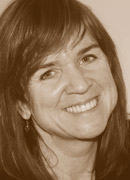

Joshua Ferris's debut novel
Then We Came to the End was a great favorite among Powell's folks and critics alike. One of the rare titles that lived up to an incredible amount of pre-publication excitement, Ferris's hilarious and existential send-up of office life resonated with readers everywhere. (You can read Dave's 2007 interview with Ferris
here.)
Maud Newton, writing in
Newsday, described it thus: "Brilliant and incredibly funny....An insightful, expansive, and often hilarious story, a novel so complex it may well deserve
Jim Shepard's assessment: 'the
Catch-22 of the business world.'"
The Unnamed, Ferris's new work, is a very different (and much darker) book, but his clarity of voice, urgency of purpose, fascinating characters, and even hints of humor remain. The "unnamed" refers to a disease that attorney Tim Farnsworth — and only Tim Farnsworth — seems to have: at certain times in his life, he can't stop walking. For anything. Ferris's novel examines the consequences this disease has on Tim's law career, family, life, and sanity, and the result is a marvelous and heartbreaking meditation on the mind and body and the nature of identity. "A vastly satisfying and original book," Publishers Weekly raved in a starred review.
Reagan Arthur, editor of Joshua Ferris as well as other literary superstars like Kate Atkinson, Sherman Alexie, and Ian Rankin, has started her own imprint within Little, Brown called Reagan Arthur Books. The Unnamed is the first title to be published under the new imprint.
÷ ÷ ÷
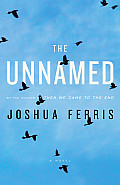 Jill Owens: Reagan, how did you choose The Unnamed as the title that would launch your new imprint?
Jill Owens: Reagan, how did you choose The Unnamed as the title that would launch your new imprint?
Reagan Arthur: It was just lucky timing. The way the scheduling worked out, we were able to make this the first book. As we were planning ahead for the future list, I knew when we wanted to launch the list, and this was the perfect book to do it with.
Joshua Ferris: I bribed her. I bribed them all. [Laughter]
Jill: How did Reagan Arthur Books come about in the first place?
Arthur: It was something that came up here that my boss, Michael Pietsch, suggested we try. Little, Brown has a great list, and so we wanted to do something to be a part of that, to maybe try publishing in a slightly different way, but still keeping very much in line with Little, Brown's identity and their tradition of publishing great literary writers.
Jill: Joshua, how did this book begin? How did you come up with this disease?
Ferris: I don't know. I can't reconstruct the moment that I had the idea. I wish I could. I did know that it was an idea that was adequate to the task of expending the time to figure out whether I wanted to spend months and years on it. It was an idea that was compelling to me.
Though I can't remember the first thing about when I had the concept in mind, I remember shortly thereafter I started going point by point through the book with a friend of mine at lunch. It doesn't look much like the book that I described to him, but I had it fairly fully fleshed out even when I only had the concept.
Jill: How was the editing process, for both of you?
Arthur: We're looking at each other, quizzically. [Laughter]
Ferris: The first thing that I remember was in 2007… I mean, we hadn't talked about a second book, and there were certainly no transactional discussions or anything like that. Reagan and I were flying to Los Angeles, and I showed her pages. It was a very different book then from what it became. But at that point in time, there was no reason to be anything other than what she was, which was supportive.
Then, at least from my point of view, every once in awhile, I would drop pages on her, and she would give me a lot of encouragement and feedback, and by the time the book was finished, there was a more extensive conversation about whether or not it was too long, or where things needed to be finessed. But it was kind of like a two-year editor-author conversation, in a way.
Arthur: I think also Josh's agent, Julie Barer, had editorial comments — she had things to say, right?
Ferris: She's a woman with opinions. [Laughter]
Arthur: And Josh also has a wonderful editor in England, at Viking, Mary Mount. She also had editorial input. It was a group thing.
Ferris: There was a vast team making sure that I didn't fuck up, basically. [Laughter]
Arthur: But honestly, there wasn't much to say or do. It came in so beautifully.
Jill: So when you say it changed a lot from the original form, that was still mostly just you, Josh, working on it.
Ferris: Yes, I think I had a couple of chronological missteps. I started in the wrong place, and then drove myself into a couple of black holes. But with enough separation from the material, things fell into place, and I realized I needed to start it at a different point in time. From that point, it was more or less putting the hours in. I had figured the puzzle out, more or less. I don't want to make it sound like once I figured it out it was easy. It was never easy, because I was always struggling with what to do, but once I knew where to start the book I was on firm ground.
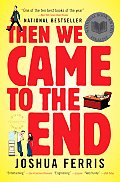 Jill: How did you think about point of view this time compared to the way you thought about it for Then We Came to the End?
Jill: How did you think about point of view this time compared to the way you thought about it for Then We Came to the End?
Ferris: The last book was a bonanza of point of view. It was first person plural, but basically when that got tiresome to me as a writer, I figured it had gotten tiresome for the reader about two sentences back, so I stopped and entered into a third person. Or first person — there were a lot of emails in the book. Then obviously in the middle section, it was third person, and sometimes, on very rare occasions, it was even being narrated in the second person. It was a kind of fantasia of all the different ways that I had thought about point of view, being a student and just being an admirer of nifty craft decisions.
The Unnamed is a radical departure point-of-view-wise, because it has to stay in more or less a very close third person point of view. It was much more restraining; it caused a great deal more problems. The interesting thing is that the book, which would seem to be much more confining, point-of-view-wise, was much more liberating, and the more traditional point of view was much more constraining.
Jill: The point of view in this book seemed to me to really be connected to the pacing. The latter part of the book seemed to have a kind of spiraling pacing following Tim's walks.
Ferris: The circumstances of Tim's life determined who was going to be allowed to speak and who wasn't. At a certain point in the book, when Tim has a break with reality, the rules of the book at that point weren't really going to allow me to move to another character very frequently. The latter half of the book is then more or less, with a couple of exceptions, in the head of Tim. I think that was necessary because the book itself is a descent into deeper and deeper interiority.
The other characters, while they have reactions to Tim's situation that the reader is privy to, don't have the same extreme break that he does. To a large extent, they present a non-insane counterpoint. Their appearance in the latter half of the book presents a counterpoint to his madness, in essence. Their interiority isn't as necessary as it was in the first half, because you know how they feel from a more objective point of view. A lot of bad things happen to Tim at a certain point in the book, and you don't really need to know, from the other characters' point of view, how they're feeling about that.
That does then affect the pacing, because you're so much with Tim that there's no break, so it probably reads faster.
Jill: I like that you use the word "interiority," because the descriptions of the external world, even at the beginning, are almost always incredibly harsh — they're icy or fiery. There's a strong interior/exterior dynamic going on in the book which seemed analogous to the mind/body duality, to me.
Ferris: That's nifty; I never thought of that, but I like it.
Jill: One of the most striking visual images of the book for me were the bees, at his window and then later the carpet of dead bees. I was wondering how the bees got into the novel, and also, Reagan, what was one of the more striking images for you.
Arthur: Everyone talks about the bees.
Ferris: Yes, the bees are a big one.
Arthur: I love the bees. I love — if I can steal shamelessly from another interview that Josh did with David Sedaris — the toe in the sock. That's an image you can't get rid of. And I loved the birds, which we ended up using for the jacket.
Ferris: Bees are remarkable beings. I wish I had made more of them. I wish I had had the room and the ability, which I lack, to make more hay of the bees, because they have a remarkable homing instinct. They can go for many miles — I think up to ten miles — and then return to the hive. The miles don't have to be a straight shot; they can be very circuitous. Then they go back to the hive, and when they've found food, they do this very elaborate dance. The dance communicates to their compatriots where the food is found. So they do four turns, and then a turn counterclockwise, and then some other funky bee stuff, and through this elaborate dance, they communicate how to get precisely to the food.
I like bees, because they're about going out, traveling and journeying, and then returning home. There's kind of a code that is cracked, in order to get home with the food and the sustenance that is necessary to continue living and to feed the hive and so forth. I found that to be a very compelling metaphor for the ways in which we tend to one another within a family, and also the elaborateness of the bees' dance seems to me so inscrutable and complex. If I were a bee, and I were watching this bee do a dance, I'd be like, "I think I take a left, but I don't know," so I'd take a left, and I'd be lost, and I think I would die. [Laughter]
Arthur: So you're glad you're not a bee.
Ferris: I'm glad I'm not a bee, but for those reasons, I was compelled to write about bees. There's also the recent bee death syndrome, which is called colony collapse syndrome. They're dying in huge numbers.
Jill: Maybe that's one reason the bee imagery is resonating with so many people, is because that's happening right now. A lot of the details of the book felt like that to me. Everything you're writing about is happening now, but it has a sort of post-apocalyptic feel, in a way.
Ferris: Nothing Tim is encountering is something we ourselves couldn't encounter. We can have harsh winters, and we're informed daily about strange behavior in nature. I think it's relatable in the sense that it's conceivable. I'm not sure that everything is happening exactly as the book's describing it, but the general feeling of an unspecified malaise is hopefully conveyed without also losing, especially when Tim finds himself in the West, the pristine beauty of the country and the landscape. It's odd to me, living in Brooklyn and being more or less a city person, to travel out West and see that miles and miles of land have remained either farmed or untouched. To me, that's the counterpoint to all of the mundane ugliness that he encounters as well.
Jill: I was interested in the case that Tim was working on. Whether R. H. has killed his wife, and the man with the knife who disappears. The surrealism of that case haunts the rest of the book a bit, since no one else can confirm the man's existence. How did you choose that case for him to be working on?
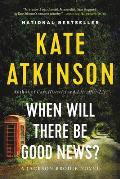 Ferris: I should say, first of all, that I knew that Reagan also edits people like George Pelecanos and Ian Rankin and Kate Atkinson, so when I started off into territory that I'm not ordinarily comfortable with, I figured I could farm out some of the work to her other authors, who are far more adept at those things than I am. [Laughter] But there were no takers, unfortunately.
Ferris: I should say, first of all, that I knew that Reagan also edits people like George Pelecanos and Ian Rankin and Kate Atkinson, so when I started off into territory that I'm not ordinarily comfortable with, I figured I could farm out some of the work to her other authors, who are far more adept at those things than I am. [Laughter] But there were no takers, unfortunately.
There was always a strict analogy, for me, between medicine and law, in that we think of medicine and law as being almost synonymous with science. We think of science as being a kind of preeminent pursuit whose eventual resolving will result in everyone's health and harmony. But it's much more messy than that, and medicine is in fact still an art that can be as crude as bloodletting. The best doctors understand that it's an art, and look for release in addition to treatment and cure.
In law, you have a much more binary decision — someone is either guilty or not guilty. But that too is much more complex when you get down to the facts of the case. Whether or not R. H., in the book, is guilty, contains the same spectrum of doubt as Tim's walking condition. The only person who can testify to R. H.'s innocence is somebody who cannot be found. In the same way I think there must be somebody, at least in the world of the novel, who might be able to diagnose and treat Tim. But just as R. H. is unable to find his savior, Tim is unable to find a doctor or a scientist who would have some sort of lead on alleviating his suffering.
Jill: Did you consciously set out to explore the concept of an unreliable narrator in this book?
Ferris: Is the narrator unreliable?
Jill: At times, no, certainly, but with some of Tim's visions, and his religious experiences, you're never sure whether they're actually happening.
Ferris: I would say that the narrator is very reliable, but the character is not. The character is unreliable, and very often, the character and the narrator are indistinguishable from one another, because basically we're in Tim's thoughts. But every once in awhile, the narrator will make himself known, by saying, "He was diagnosed with this or that," and Tim could never really know what he was diagnosed with, because by that point, he's unconscious. He can also say things that Tim might not notice, like "There was beauty everywhere," and then go on to list all of the things in the landscape through which Tim is walking that Tim himself might not notice because he's too sick or distracted.
Arthur: My mom is reading the book now. She's been calling me every night, to say, "Okay, well, it's getting a little dark." [Laughter] Last night when we talked, she said, "Well, at least he's got that job." I think that's what you're talking about, is that moment where you think, "Okay, things are working out for Tim, he's back at work," and then you realize, "Oh, no." I don't want to give it away from your readers, but one of the many wonderful things about the book is the way that there's that moment of uncertainty about not just his fate, but what might actually be happening in his mind versus what's happening in the real world.
Ferris: Actually, at that point, I think you were right, that it is an unreliable narrator at that point. The narrator is not coming forward and saying, "Here's the real scoop."
Jill: Speaking of his job, how did you think about work in this novel compared to Then We Came to the End?
Ferris: I think that they're very closely related to one another. My notion of work didn't change from one book to the next. I think for the most part, we live our day-to-day lives rather distracted and caught up in our own inertia. For most of the people in Then We Came to the End, they were very content to be distracted by the antics of the office, until they were called to attention by the fact that their jobs were on the line.
In The Unnamed, the stakes are much higher, because it's not merely his job that's on the line. It's his job, his family, his client's freedom, and then ultimately his mental and physical well-being. But his attempt to hang on to the job is not only the great seduction of work, and distracting ourselves from other questions — questions of death, questions of the importance of other people — but it's the very last redoubt that he has against the disease.
Ironically, because it played a much smaller role, work becomes a much more important factor in this one man's life than it was in Then We Came to the End, because it is his existence, and without it, he is very lost in the world. Even if he didn't have the walking disease, if Tim didn't go in to work, I don't know who he'd be.
Jill: There's the moment when Tim is listening to the conversation of strangers in line, and he thinks, "Had he ever unplugged his ears of the self-involvement that consumed him about work, when he wasn't sick, or about sickness, when he couldn't work? Had he never listened?" In the second half of the book, to me, it seems he's beginning to try to learn to listen.
Ferris: I think that's a great reading of the book. Despite the dark things that happen, it is about a man becoming aware not only of his own emotional life but of the life that surrounds him. It's a hard lesson to learn, and it's forced upon him by this unnamed disease, but it is, I think, some recompense for his misfortune.
Jill: Reagan, how did you start editing Joshua originally?
Arthur: Josh and I love to tell this story. [Laughter] Josh's agent Julie sent me Then We Came to the End in an old-fashioned manuscript box.
Ferris: They don't have those any more?
Arthur: No. At the time, we didn't have e-readers yet. She had written a very good cover letter for it, and I started to read it at my desk. I loved the beginning, so I took it home with me, and sat on my couch and finished it that night.
Ferris: Which is mind-blowing to me, finishing a book in a night.
Arthur: I came in the next day, and told my boss, Michael Pietsch, that we had to have it. I told Julie we had to have it. From Wednesday to Friday, we managed to pull together an offer and buy it, and then Friday, I met Josh and we had lunch and celebrated. So it was a 48-hour whirlwind romance.
Jill: Is that a record?
Arthur: For me it is! Also, he lived here in Brooklyn, so that made it easier to celebrate right then and there. I've said this before, but it was one of the happiest publishing experiences I've ever had. It started off on a really nice foot.
Ferris: It really did. From my point of view, I was going to go on a run in order to calm my nerves on Thursday morning. I thought, "What if somebody calls?" Then I thought, "Don't be an ass." So I went on the run, and sure enough, I had a voicemail from my agent when I came back from the run, saying that somebody at Little, Brown had made an offer. Then, within the next 24 hours, we were arranging lunch.
It was certainly a dream for me, and not one that I expected. And I have to say, if I can get sappy for a moment, I've made a great friend here. It has been a very long friendship so far, and a very fruitful one.
Jill: Reagan, what do you look for in general in a book that you want to publish?
Arthur: It's kind of hard to say, though I should be able to say it by now. Definitely voice, and story, and purpose. My first boss in publishing had this line he'd trot out for young editors trying to buy their first book: "Competent, skillful, literate, and ultimately forgettable." And, of course, we would all walk away crushed. But it's a good lesson to remember, that something can be good without necessarily needing to be published.
What I am looking for are things that often have a spark of humor, even when they're not necessarily comic novels. I'm drawn to people who can say things in an interesting, different, maybe funny way, but who are also saying something worth saying.
Jill: What's one of your favorite books that is coming out from another publisher this year?
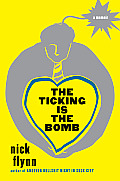 Arthur: I'm looking forward to Anne Tyler's book that just came out. I just saw somewhere that Charles D'Ambrosio is coming out with a new one; is that true?
Arthur: I'm looking forward to Anne Tyler's book that just came out. I just saw somewhere that Charles D'Ambrosio is coming out with a new one; is that true?
Jill: I think I've heard that, too, and I love him, so I'll be excited, if so.
Arthur: Someone just sent me a galley of Nick Flynn's new book, which looks good.
Ferris: I love the title of it — The Ticking Is the Bomb is a great title.
Arthur: And Alex Lemon's Happy.
Jill: Have either of you read the new Don DeLillo yet?
Ferris: I've read it, and I think it's excellent.
Jill: I loved it. I read it the same day I reread The Unnamed, and it reminded me that in Dave's interview with you, he brought up White Noise. I can see a few similarities, too.
Ferris: He's constantly stealing from me. Our lawyer is on it. [Laughter]
Jill: Reagan, what are your predictions for the future of publishing?
Arthur: I think we're in a really dramatic, ground-shifting time right now. We've really felt it acutely this past fall. I think in general, the book will prevail, and it will prevail in forms that we're still trying to work our ways around, but it's stronger than we might be worried about right now. I for one loved Jonathan Galassi's op-ed last week. Every time I go out with people who work or don't work in publishing lately, this comes up: there's this contention that ebooks should somehow be free, or at the most, $9.99. That's not taking into account what Galassi talks about in that op-ed piece, which is everything that goes into publishing the book so that you know about it in the first place. It can't just arrive out of nowhere on your e-reader without someone having written it and a lot of people having worked to publish it.
My point is that I want people to appreciate books, and in order to do that, they need to be published properly. The final form is changing, but ultimately, it's books themselves that matter.
Reagan Arthur and Joshua Ferris spoke from Reagan's office in New York on January 6, 2010.